Politics
Trump urges Putin not to escalate war during phone call, reports say
Published
5 months agoon
By
Ekwutos BlogDonald Trump held a phone conversation with Russian president Vladimir Putin on Thursday advising him not to escalate the war in Ukraine according to the Washington Post, citing well-placed sources.
The president-elect warned Putin of the America’s “sizeable military presence in Europe” as he urged restraint in the conflict, which is entering its third year.
The outlet added that Trump had expressed interest in a follow up conversation between the pair to resolve Ukraine’s war “soon.”
Trump has previously boasted on the campaign trail that he would end the war in Ukraine in “24 hours” — although has not provided concrete details how he would achieve this.
Putin congratulated Trump on his election victory in comments made last Thursday, going so far to praise Trump’s courage during an assassination attempt on his life at a rally in Pennsylvania in July.
“He manifested himself in the very correct way, bravely as a man,” Putin said.
The Russian leader added he welcomed Trump’s claim he could end the war, but that he was not aware of what Trump’s concrete proposals were.
Kremlin spokesperson Dmitry Peskov emphasised that Moscow still views the US as an “unfriendly” country and that ties between Russia and the US were at their lowest point in history.
Trump is known to be friendly towards Putin. When he was elected in 2016, Moscow had hopes that Trump would scrap sanctions against the country.
Since then, Putin has repeatedly noted Trump’s first term saw the introduction of the heaviest sanctions against Russia at that time.
In a statement given to the Post, Trump’s spokesperson Steven Cheung said of the call between Putin and Trump: “President Trump won a historic election decisively and leaders from around the world know America will return to prominence on the world stage.”
Cheung added that world leaders had begun to try and develop relationships with Trump as he represents “global peace and stability.”
Kyiv disputes claim
The Washington Post claimed that Ukraine’s foreign ministry knew about the call and didn’t object to the conversation taking place, a claim Kyiv’s foreign ministry told Reuters was false.
Ukrainian President Volodymyr Zelenskyy already spoke with Trump during a phone call on Wednesday.
Zelenskyy called Trump to congratulate him on his election victory. Although it isn’t known what the pair discussed, SpaceX owner Elon Musk reportedly took part in the call with Zelenskyy thanking him for providing Ukraine with access to the Starlink satellite internet platform.
Trump’s election could signal a shift in US foreign policy towards Ukraine. The president-elect is wary of US involvement in foreign conflicts and has previously suggested the money would be better spent domestically.
Current US President Joe Biden is set to meet Trump at the Oval Office on Wednesday to discuss the transition of power, and brief the new president on the wars in Ukraine and the Middle East.
National Security Adviser Jake Sullivan told CBS, “President Biden will have the opportunity over the next 70 days to make the case to the Congress and to the incoming administration that the United States should not walk away from Ukraine, that walking away from Ukraine means more instability in Europe.”
You may like
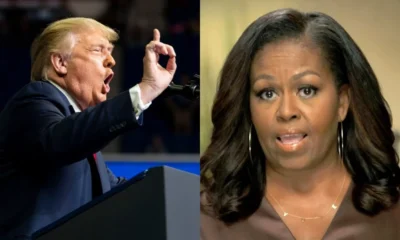

Why I snubbed Trump’s inauguration – Michelle Obama


Insecurity: Nigerian Govs set up team to partner security agencies
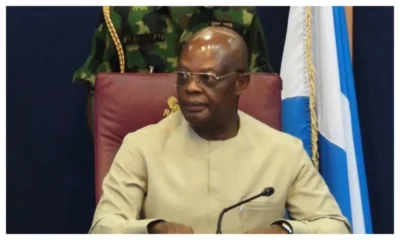

Rivers Sole Administrator, Ibas attends National Economic Council meeting in Aso Rock
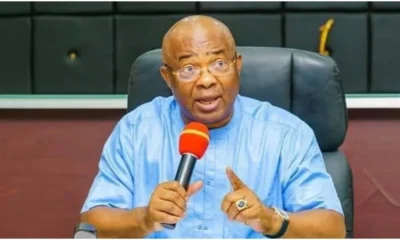

JUST IN: Governor Hope Uzodinma gives commercial drivers in Imo state, 72-hour deadline to remove tinted windows from cars or face strict consequences.


US indicts Nigerian man for $690,000 fraud, lying to obtain American citizenship
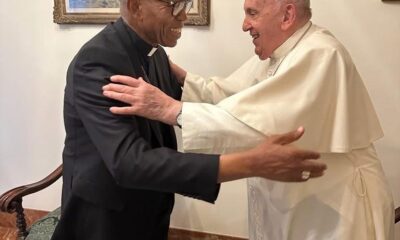

VATICAN PUBLISHES PROGRAMS FOR NINE DAYS MOURNING OF POPE FRANCIS
Politics
Why I snubbed Trump’s inauguration – Michelle Obama
Published
34 minutes agoon
April 24, 2025By
Ekwutos Blog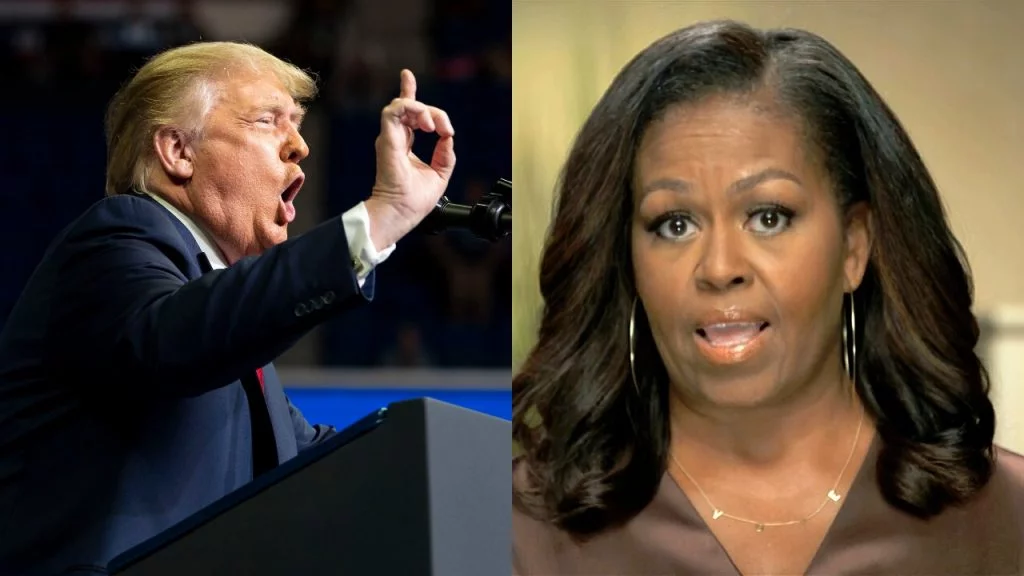
Former US First Lady, Michelle Obama, has explained decision to snub President Donald Trump’s second inauguration earlier this year.
Obama’s absence led to a lot of speculation and criticism.
She had also skipped former President Jimmy Carter’s funeral on January 9.
But speaking on the latest episode of her podcast IMO with Michelle Obama and Craig Robinson, which she co-hosts with her brother, she opened up on her reasons.
In a discussion with actress Taraji P. Henson, she opened up about the deeply personal reasons behind her decision.
“My decision to skip the inauguration — you know what people don’t realize or my decision to make choices at the beginning of this year that suited me, were met with such ridicule and criticism,” she said.
“People couldn’t believe that I was saying no for any other reason, they had to assume that my marriage was falling apart.
“While I’m here really trying to own my life and intentionally practice making the choice that was right for me.”
Politics
Insecurity: Nigerian Govs set up team to partner security agencies
Published
49 minutes agoon
April 24, 2025By
Ekwutos Blog
The Nigeria Governors’ Forum has set up a sub-committee to collaborate with heads of security agencies for immediate solution to security challenges in the country.
Imo State governor, Hope Uzodinma announced this in the early hours of Thursday while reading a communique issued after the NGF’s second meeting held late Wednesday night in Abuja.
The communique was signed by the forum’s Chairman, Governor AbdulRahman AbdulRazaq of Kwara.
Uzodinma noted that the governors’ decision was as a result of their admiration for technology-driven solutions presented by the Chief of Defence Staff (CDS), who made a presentation at the meeting.
”The Forum received a presentation from the CDS on an innovative security initiative aimed at strengthening national and sub-national capacity for early threat detection and coordinated response.
”The project envisions the phased deployment of advanced technology and infrastructure to improve surveillance, crisis management and public safety.
”Governors expressed support for the initiative’s objectives and underscored the importance of technology-driven solutions in addressing evolving security challenges at the state level.
”Governors also commended the CDS and indeed the Nigerian military for these valuable propositions and initiatives,” he said.
Uzodinma added that the forum also received a presentation from the Minister of Housing and Urban Development, Ahmed Dangiwa, on unlocking the economic potential of land through a Federal-State partnership for land reform.
He said that the minister outlined ongoing housing initiatives under the Renewed Hope Programme and proposed a comprehensive land registration reform to formalise land ownership, enhance tenure security and boost internally generated revenue across states.
”The Forum also received a presentation on a proposed strategic partnership with Powercom Smart Grid Nigeria Limited (PSGN), aimed at revitalising the electricity distribution sector through private sector investment.
”Under the proposed agreement, PSGN will assume operational control of select distribution companies (Discos), introduce advanced smart grid technologies and establish a meter production facility to enhance service delivery and energy across states,’’ he said.
Dangiwa who spoke earlier in an interview with newsmen, said the presentation was to update the governors on the current administration’s Renewed Hope Cities and Estates Programme.
The minister said, the presentation was also to request for land from all the state governors yet to offer the required land needed for the housing programme.
Also speaking, Governor Uba Sani of Kaduna State said the recent killings and attacks in some states should not be seen as an indictment on the governors because they have limited roles to play in addressing security challenges.
Sani said while he agreed with the National Security Council comment he also believed that security agencies in Nigeria should also step up action and do what is right.
He said that while leaders must take responsibility, there was need for all stakeholders to work together and address the problem of insecurity.
”In my opinion, it is not an indictment. I do agree that we have a limited role to play concerning the constitution of Nigeria.
”By the grace of God, it is one of the areas we are going to look at, the possibility of the creation of state police in Nigeria, which for me would go a long way in tackling insecurity, particularly at the sub-national level,’’ he said.
Politics
Rivers Sole Administrator, Ibas attends National Economic Council meeting in Aso Rock
Published
56 minutes agoon
April 24, 2025By
Ekwutos Blog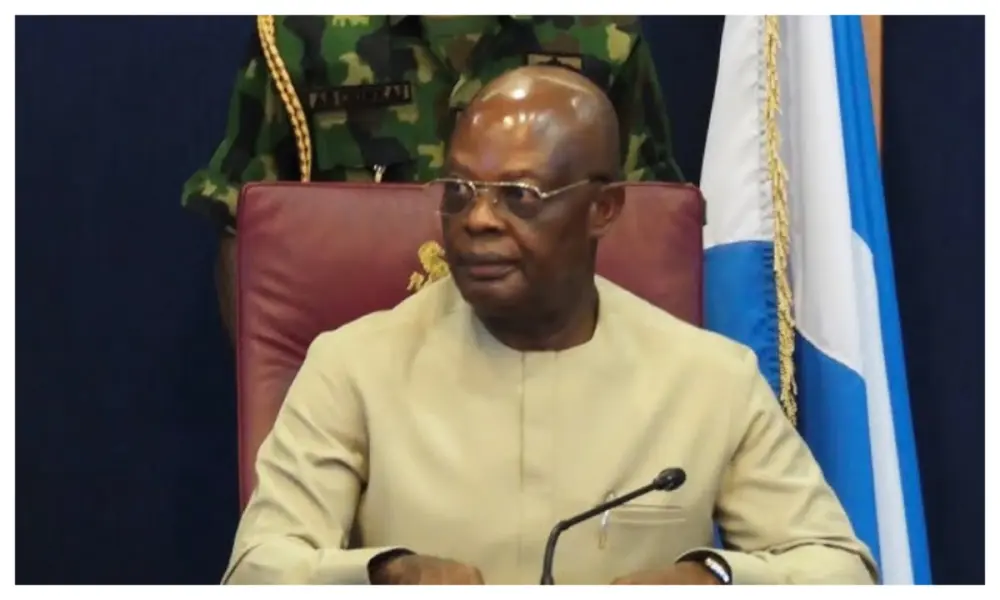
Vice President Kashim Shettima is currently presiding over the National Economic Council, NEC, meeting at the Presidential Villa, Abuja.
Surprisingly, the Sole Administrator of Rivers State, Ibok-Eke Ibas, is in attendance.
Governor of Delta State, Sheriff Oborevwori, who just defected from the Peoples Democratic Party, PDP, to the All Progressives Congress, APC, is also at the meeting.
Other governors spotted at the meeting include Rev. Fr. Hyacinth Alia, Benue; Abdulrahman Abdulrazak, Kwara; Monday Okpebholo, Edo; and Bassey Otu, Cross River.
A number of deputy governors are also in attendance.
The National Economic Council meeting is usually chaired by the Vice President. The meeting deliberates on issues that concern Nigeria’s economy.
More details later…

Why I snubbed Trump’s inauguration – Michelle Obama

Insecurity: Nigerian Govs set up team to partner security agencies

Rivers Sole Administrator, Ibas attends National Economic Council meeting in Aso Rock
Trending

 Trending6 months ago
Trending6 months agoNYA demands release of ‘abducted’ Imo chairman, preaches good governance
- Business6 months ago
US court acquits Air Peace boss, slams Mayfield $4000 fine

 Politics6 months ago
Politics6 months agoMexico’s new president causes concern just weeks before the US elections
- Entertainment6 months ago
Bobrisky transferred from Immigration to FCID, spends night behind bars
- Entertainment6 months ago
Bobrisky falls ill in police custody, rushed to hospital

 Politics6 months ago
Politics6 months agoRussia bans imports of agro-products from Kazakhstan after refusal to join BRICS

 Politics6 months ago
Politics6 months agoPutin invites 20 world leaders
- Politics1 year ago
Nigerian Senate passes Bill seeking the establishment of the South East Development Commission.

